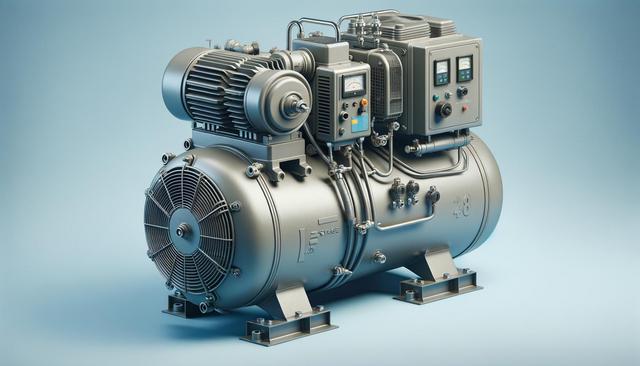What Is a Two-Stage Industrial Air Compressor?
A two-stage industrial air compressor is a type of air compressor that compresses air in two stages to achieve higher pressure levels more efficiently. In contrast to single-stage compressors, which compress air in one stroke, two-stage models use two pistons of different sizes. The first piston compresses air to an intermediate pressure, and then it is cooled before being compressed further by the second piston. This staged process reduces the workload on each piston and minimizes heat generation, which improves overall efficiency and extends the compressor’s lifespan.
These compressors are commonly used in industrial settings where constant, high-pressure air is required. Applications include powering pneumatic tools, operating production machinery, and supporting HVAC systems. The two-stage process also leads to improved energy efficiency, making these systems an attractive option for businesses seeking long-term operational savings.
Key Benefits of Two-Stage Compressors
Two-stage industrial air compressors offer several advantages that make them suitable for high-demand environments. Some of the main benefits include:
- Higher efficiency: The cooling stage between the two compression steps reduces the air temperature, requiring less energy for the second stage of compression.
- Improved durability: Distributing the workload across two stages lowers wear and tear on individual components.
- Better performance at high pressures: Two-stage compressors can reliably deliver air at pressures above 100 PSI, which is essential for many industrial applications.
- Reduced moisture build-up: The intercooling process helps condense and remove moisture, reducing the risk of water damage to tools and machinery.
These benefits contribute to more stable and consistent performance, especially in operations where downtime can be costly.
Common Applications in Industry
Two-stage industrial air compressors are found across a wide range of sectors due to their robust performance and reliability. Key industries that rely on this technology include:
- Manufacturing: Used for powering assembly line tools, robotic arms, and material handling systems.
- Automotive: Essential in paint booths, tire inflation systems, and air-powered tools.
- Food and beverage: Supports packaging, bottling, and food processing operations where clean, dry air is required.
- Pharmaceutical: Helps maintain sterile environments and powers precision laboratory instruments.
In each of these settings, the consistent high-pressure output and reduced operational noise of two-stage compressors help maintain workflow efficiency and product quality.
Maintenance and Operation Considerations
While two-stage compressors are known for their reliability, proper maintenance is essential to ensure optimal performance. Routine inspection and servicing can prevent unexpected breakdowns and extend equipment life. Key maintenance tips include:
- Checking and replacing air filters regularly to ensure clean airflow.
- Monitoring oil levels and replacing compressor oil as recommended by the manufacturer.
- Inspecting belts and pulleys for signs of wear or misalignment.
- Draining moisture from the air receiver tank to prevent corrosion.
- Examining electrical connections and safety switches for integrity.
Operators should also be trained in the specific procedures for starting, running, and shutting down the equipment to avoid operational errors. Using the compressor within its rated capacity and duty cycle is equally important for longevity.
Choosing the Right Compressor for Your Needs
Selecting the appropriate two-stage industrial air compressor involves evaluating several factors unique to your business operations. Some of the most important considerations include:
- Required air pressure and flow rate: Determine the PSI and CFM needed for your tools and equipment.
- Duty cycle: Consider whether the compressor needs to run continuously or intermittently.
- Environment: Assess whether the compressor will be used indoors or outdoors and the ambient conditions it will face.
- Noise level: In noise-sensitive environments, look for models with sound-dampening features.
- Footprint and mobility: Choose a unit that fits your available space and mobility requirements.
Consulting with an experienced supplier or technician can also help you match your needs with the right compressor specifications. Investing time in the selection process can lead to better performance and energy efficiency over the long term.
Conclusion: Supporting Productivity with Reliable Air Power
Two-stage industrial air compressors are a vital asset in operations that demand consistent, high-pressure air. Their ability to deliver efficient, durable, and high-performing compressed air makes them a dependable choice for a wide range of industrial settings. By understanding how these compressors work, their benefits, and how to maintain them properly, businesses can make informed decisions that enhance productivity and reduce operational costs. Whether you’re upgrading from a single-stage unit or outfitting a new facility, a two-stage compressor may offer the performance and reliability your operation requires.








